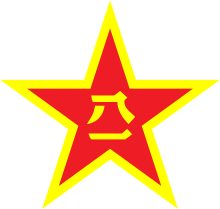People's Liberation Army Astronaut Corps
| People's Liberation Army Astronaut Corps | |
|---|---|
 Emblem of the People's Liberation Army | |
| Active | 1998 |
| Country | |
| Allegiance | |
| Branch | |
| Part of | |
The People's Liberation Army Astronaut Corps (PLAAC; Chinese: 中国人民解放军航天员大队), also known as the Chinese Astronaut Corps (Chinese: 中国航天员大队), is a Beijing-based sub-corps-level People's Liberation Army Strategic Support Force (PLASSF) unit directly under the PLASSF Space Systems Department (PLASSF-SSD) and is responsible for the selection and training of astronaut corps for Project 921, the Chinese manned space program.[1]
History[edit]
In October 1992, a Commission for Science, Technology and Industry for National Defense-PLAAF joint task force started the preliminary selection for astronauts; 1,506 pilots were identified and twelve were chosen as candidates.[2] The Astronaut Corps was established on January 5, 1998 and the twelve along with two PLAAF trainees sent to Yuri Gagarin Cosmonaut Training Center in 1996 forms Chinese Group 1.[3][4]
Seven pilots entered the Astronaut Corps in May 2010 as Group 2.[4]
In 2014, Group 1 astronauts Wu Jie, Li Qinglong, Chen Quan, Zhao Chuandong, and Pan Zhanchun retired from the Astronaut Corps due to age; none of them had flown in a mission.[5]
The Astronaut Corps was part of the General Armaments Department until GAD was disbanded in January 2016.[3] As part of the 2015 military reform, it became part of the Strategic Support Force.[3]
In January and March 2018, China Manned Space Agency vice director, astronaut Yang Liwei stated that Group 3 selection was expected to begin in 2018 and would include engineers and mission specialists.[6] Yang also stated that Group 3 would include civilians from industry and research institutions.[6]
See also[edit]
- List of Chinese astronauts
- Canadian Astronaut Corps
- European Astronaut Corps
- NASA Astronaut Corps
- List of astronauts by selection
- Human spaceflight
- History of spaceflight
References[edit]
- ^ "Project 921: China's Quest to Conquer Space". Royal United Services Institute. 2006-04-26. Archived from the original on 2021-06-30. Retrieved 2021-06-18.
- ^ Xi, Qixin; Fan, Juwein; Liu, Cheng (2003-10-17). Xu, Dongmei (ed.). "中国航天员诞生记" [Birth of Chinese Astronauts]. People's Daily. Xinhua. Archived from the original on 2012-05-20. Retrieved 2018-11-11.
- ^ a b c Liu, Ningzhe (2017-10-18). Zhang, Xun (ed.). "景海鹏臂章透玄机:航天员"天兵"隶属战略支援部队" [Jing Haipeng's Badge Reveals Secret: Astronaut Corps Now Part of Strategic Support Force]. Ta Kung Pao. Archived from the original on 2018-11-11. Retrieved 2018-11-11.
- ^ a b Zhang, Su; Li, Xiaofan; Zhu, Xiaoxiong (2018-01-05). Pan, Liwei (ed.). ""弱冠之年"的中国航天员大队重温誓词" [20-Year-Old Astronauts Corps Revisit Its Oath]. China News Service. Archived from the original on 2018-11-12. Retrieved 2018-11-11.
- ^ Xue, Yanwen; Shan, Ruchao; Li, Xiaofan (2018-01-24). Yang, Ru (ed.). "中国航天员:矢志飞天 初心不改" [Chinese Astronauts: Dedicated to Space Flight, Remain True to Original Intention]. Xinhua. Archived from the original on November 12, 2018. Retrieved 2018-11-11.
- ^ a b Zhang, Baoshu (2018-07-21). Zhang, Qiaosu (ed.). "中国航天半年18次发射活动密度空前 航天员团队扩编" [China Launch Frequency Broke Records Astronaut Corps Recruitment]. Xinhua. Archived from the original on 2018-11-12. Retrieved 2018-11-11.
